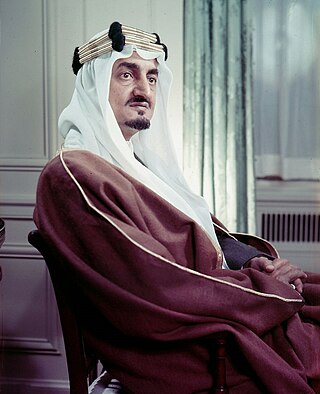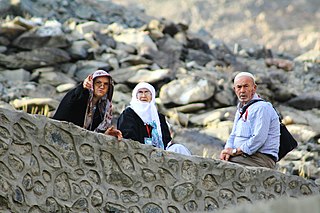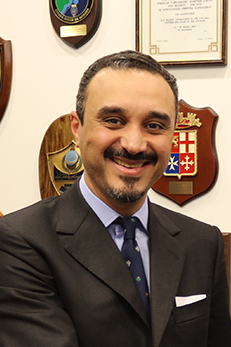
Bandar bin Sultan Al Saud is a retired Saudi Arabian diplomat, military officer, and government official who served as Saudi Arabia's ambassador to the United States from 1983 to 2005. He is a member of the House of Saud. From 2005 to 2015 he served as secretary general of the National Security Council, and was director general of the Saudi Intelligence Agency from 2012 to 2014. From 2014 to 2015 he was King Abdullah's special envoy.

Faisal bin Abdulaziz Al Saud was a Saudi Arabian statesman and diplomat who was King of Saudi Arabia from 2 November 1964 until his assassination in 1975. Prior to his ascension, he served as Crown Prince of Saudi Arabia from 9 November 1953 to 2 November 1964, and he was briefly regent to his half-brother King Saud in 1964. He was prime minister from 1954 to 1960 and from 1962 to 1975. Faisal was the third son of King Abdulaziz, the founder of modern Saudi Arabia.

Sultan bin Abdulaziz Al Saud, called Sultan the Good in Saudi Arabia, was the Saudi defense minister from 1963 to 2011 and the Crown Prince of Saudi Arabia from 2005 to 2011.

The Rashidi dynasty, also called Al Rashid or the House of Rashid, was a historic Arabian House or dynasty that existed in the Arabian Peninsula between 1836 and 1921. Its members were rulers of the Emirate of Ha'il and the most formidable enemies of the House of Saud, rulers of the Emirate of Nejd. They were centered in Ha'il, a city in northern Najd that derived its wealth from being on the route of the Hajj pilgrimage to Mecca, and was also a commercial center. The rulers of Ha'il were the sons of Abdullah bin Rashid, founder of the dynasty.
Abd al-Aziz, frequently also transliterated Abdul-Aziz, is a male Arabic Muslim given name and, in modern usage, surname. It is built from the words ʽAbd, the Arabic definite article and ʽAzīz "Almighty". The name is commonly abbreviated as "ʽAzīz". The name means "servant of the Almighty", al-ʽAzīz being one of the names of God in Islam, which give rise to the Muslim theophoric names.
Afro-Arabs, African Arabs, or Black Arabs are Arabs of full or partial indigenous African descent. These include primarily minority groups in the United Arab Emirates, Yemen, Saudi Arabia, Oman, Qatar, and Bahrain, as well as Iraq and Levant: Syria, Palestine, and Jordan. The term may also refer to various Arab groups in certain African regions.

Abdullah bin Faisal Al Saud was a Saudi Arabian businessman, politician, and poet who held multiple posts in the Saudi government throughout the 1940s and 1950s. Prince Abdullah was the eldest son of King Faisal. He served as the governor of Hejaz during the reign of his grandfather King Abdulaziz, and as the minister of health and interior during the reigns of his grandfather and his uncle King Saud. These positions made him one of the most powerful Saudi Arabian royals of his time.

Bandar bin Abdulaziz Al Saud was the tenth son of King Abdulaziz. At the time of his death, he was the eldest surviving member of the ruling branch of the House of Saud.
Hussa bint Ahmed Al Sudairi was one of the wives of King Abdulaziz of Saudi Arabia, with whom she had seven sons and four daughters. Her sons included two future Saudi kings, Fahd and Salman, as well as Sultan bin Abdulaziz and Nayef bin Abdulaziz, who both later served as crown prince. Her sons with Abdulaziz are commonly known as the Sudairi Seven.

The Order of King Abdulaziz is a Saudi Arabian order of merit. The order was named after Abdulaziz Al Saud, founder of the modern Saudi state.

Turks in Saudi Arabia also referred to as Turkish Arabians, Turkish Saudi Arabians, Saudi Arabian Turks, Arabian Turks or Saudi Turks refers to ethnic Turkish people living in Saudi Arabia. The majority of Arabian Turks descend from Ottoman settlers who arrived in the region during the Ottoman rule of Arabia. Most Ottoman Turkish descendants in Saudi Arabia trace their roots to Anatolia; however, some ethnic Turks also came from the Balkans, Cyprus, the Levant, North Africa and other regions which had significant Turkish communities. In addition to Ottoman settlement policies, Turkish pilgrims to Mecca and Medina often settled down in the area permanently.
Abdullah Al-Deayea is a retired Saudi Arabian professional football goalkeeper who played for Al-Tai and Al-Hilal. He is the elder brother of the former goalkeeper Mohamed Al-Deayea and the father of Saudi footballers Bader Al-Deayea and Sultan Al-Deayea. Mohamed started off as a handball player and came to football at the age of 15 as a striker, following the advice of Abdullah.

The Saudi National Security Council (SNSC) (Arabic: مجلس الأمن الوطني) was the body in charge of coordinating Saudi Arabia's national security, intelligence and foreign policy strategy. It was established in 2005 by King Abdullah bin Abdulaziz Al Saud. The first secretary general of the SNSC was Prince Bandar bin Sultan, the former Saudi Ambassador to the United States. The assistant secretary general of the SNSC was Prince Salman bin Sultan until 6 August 2013. The council was abolished by King Salman on 29 January 2015.

The Emirate of Jabal Shammar, also known as the Emirate of Haʾil or the Rashidi Emirate, was a state in the northern part of the Arabian Peninsula, including Najd, existing from the mid-nineteenth century to 1921. Jabal Shammar in English is translated as the "Mountain of the Shammar". Jabal Shammar's capital was Ha'il. It was led by the monarchy of the Rashidi dynasty. It included parts of modern-day Saudi Arabia, Iraq, and Jordan.

Bandar bin Khalid Al Saud is a Saudi prince and businessman. He is a minister-ranking advisor at the Royal Court and chairman of Advanced Media Holding Company (AMHC), a media group parenting an FM radio station and Al Watan.
The following is a Gregorian timeline of the history for the city of Riyadh, Saudi Arabia.

Khalid bin Bandar Al Saud is the Saudi ambassador to the United Kingdom and a member of the House of Saud.

Abdulaziz bin Abdul Rahman Al Saud (1875–1953), the founder and first king of Saudi Arabia, also called Ibn Saud, was very young when he first got married. However, his wife died shortly after their marriage. Ibn Saud remarried at eighteen and his firstborn child was Prince Turki I. He had 45 sons of whom 36 survived to adulthood and had children of their own. He also had many daughters. He is thought to have had 22 wives.
Bandar bin Faisal Al Saud was a Saudi Arabian businessman and Royal Saudi Air Force officer. A member of the Saudi royal family, he was one of the children of King Faisal and Iffat Al Thunayan.
The 2021 WAFF U-23 Championship was the second edition of the WAFF U-23 Championship, an under-23 international tournament for member nations of the West Asian Football Federation (WAFF). It took place in Saudi Arabia from 4 to 12 October 2021, featuring 11 teams. Only players born on or after 1 January 1998 were eligible to participate. Iran were the defending champions; however, they couldn't defend the title after they joined CAFA.













